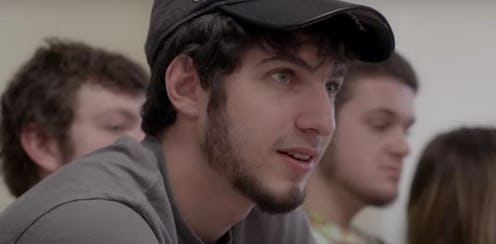TV & Movies
This Docuseries Shows What Happens When We Treat Drug Misuse With Empathy, Not Punishment
MTV's 16 and Recovering is a candid, compassionate portrait of teens grappling with substance use disorder.
For students at Northshore Recovery High in MTV’s candid new docuseries 16 and Recovering, each day begins with Group Up. It’s a chance to talk about what’s happened in the hours since school ended and what's on kids' minds heading into first period. Afterward, the cohort of about 60 teenagers head to math class and then to English, but the first thing they do is check in with each other and their teachers. Later in the day, once everyone has had a chance to share, there will still be plenty of time for pop quizzes and drug testing.
Directed by the Emmy-nominated Steve Liss, 16 And Recovering is a portrait of one year at one school in Beverly, Massachusetts, a town the mayor describes as being “devastated by opioid addiction." Recovery High is a public school for students with substance use disorder, providing them an education alongside on-demand access to counseling. In reality, the cameras quickly spot, there’s little separation between these services. When a 17-year-old named Sam relapses, he confides in his art teacher. And when 16-year-old Alba is suicidal, it’s Northshore’s affectionate founder and principal, Michelle Lipinski, who tells her that a world without the giggly teen is unimaginable.
Cameras also occasionally follow the students home, where, at least for Sam and Alba, loving families await them in safe and sturdy houses. It’s in these fragments of home life — eating pizza, watching movies — that 16 and Recovering distinguishes itself from other portrayals of substance use disorder. We don’t hear confessional interviews about how the students’ parents failed them or the depressed economics of the town they live in or the trauma that underlies the kids’ opiate use. Instead, 16 and Recovering conjures compassion for its subjects delicately, without trying to explain how or why they've gotten to where they are. If the show has an agenda, it’s not to make a broader point about the causes of harmful drug use. Alba is depressed; Sam is anxious. We can be sure painful things have happened to them that we don’t know about. What’s more interesting, and refreshingly less voyeuristic, than picking at the root of their pain is how affecting it is to never be told much about it in the first place. Because 16 And Recovering is not a documentary about preventing teen substance misuse; it’s about what happens in the aftermath.
At Recovery High, students don’t get sent home for arriving stoned. When they fail a drug test, they get hugged. There’s an understanding among faculty that traditional discipline won't help; the kids are more upset with themselves when they relapse than any adult could be. So when Sam comes to school high, his mentor tells him how proud she is of his work on the yearbook. Lipinski says a deliberate goodbye to her students as they leave school, and there’s a sense that she would follow each of them home, too, if she could — pick which streets they walk down and which friends they hang out with. The students feel safest when they're in our sights. Each time the text “a few weeks later” flickers onto the screen, bad news feels close by.
And the bad news usually comes. Sobriety at Recovery High is mostly measured in days and, from time to time, in months. There are relapses and runaways. But the tension on screen doesn’t come from worrying about how far these kids will fall before their parents and teachers can solve what ails them. For the parents and teachers, the challenge is to keep supporting the kids knowing that they can’t solve it for them. And for viewers, the challenge is to realize we don't need to know what led these students to where they are in order to understand how much it will cost their communities to heal them.
If you or someone you know is seeking help for substance use, call the SAMHSA National Helpline at 1-800-662-HELP(4357).
If you or someone you know is experiencing suicidal thoughts, call the National Suicide Prevention Hotline at 1-800-273-8255 or text HOME to the Crisis Text Line at 741741. You can also reach out to the Trans Lifeline at 877-565-8860 or the Trevor Lifeline at 1-866-488-7386, or to your local suicide crisis center.
This article was originally published on
